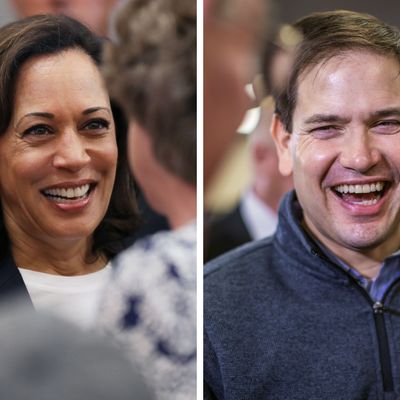
Ben: After a breakout debate performance a couple months ago, Kamala Harris seemed to be ascending in the Democratic race. But she hasn’t really been able to connect with voters in a sustained way. More than one writer has compared her to Marco Rubio — a telegenic, great-on-paper candidate with somewhat shape-shifting views, who fails to break through enough to pose a real threat to the front-runner. Do you think that comparison holds up?
Ed: A bit too early to say, but you can sure see the similarities. I’d add that like Rubio, she has some identity-politics advantages (Republicans in theory liked the idea of a Hispanic nominee), as a part Asian-American, part African-American woman. And like Rubio, she has a pretty clear path to the nomination: Exceed expectations in Iowa and New Hampshire, win in South Carolina, begin to clean up in the candidate’s home state (Florida for Rubio, California for Harris). Harris’s strategy, as I’ve observed before, is an updated version of Obama’s in 2008. But at this point, she’s showing persistent weakness among black voters who prefer Joe Biden.
Ben: Rubio developed a reputation for blowing with the political winds (Trump has flip- flopped on almost every major position in his life, but never mind that). Thanks in large part to her vague and confusing positions on health care, Harris is sometimes tagged with that label as well. How much do you think it has hurt her?
Ed: Yeah, Harris kind of oozes calculation, which can lead to a rep for flip-flopping and inauthenticity. In Rubio’s case, it wasn’t just flip-flopping that was a problem: He got a crucial issue dead wrong (immigration) and then spent the entire campaign crawling back on it, apologizing the whole way.
Some people think Harris’s record as a prosecutor similarly wrong-foots her with her party in this particular year…though it’s ironic if that’s true, since the beneficiary is mostly Joe “lock ’em up” Biden.
Ben: It’s hard to tell how much of a liability her criminal-justice background has been.
Ed: Yes, but when you’re as dependent as she is on a breakthrough among African-Americans, it doesn’t help that a lot of black activists really dislike her.
Ben: But Joe Biden gets a pass with, as you said, a similarly pockmarked record.
Ed: That gets to her central problem: She may have Obama’s strategy, but Biden has the support of Obama’s fans. I don’t think it’s as inherently as difficult a problem as Rubio’s, which was an unorthodox and entirely unscrupulous opponent whose top issue was the one L’il Marco did not want to talk about.
Ben: So what could Harris do to escape the position she currently finds herself in, which is to say, liked well enough by most, but not the first choice of many?
Ed: Well, she can certainly hope bad things happen to Biden, who is directly athwart her path. And if Bernie Sanders somehow knocks Elizabeth Warren out of the race, she could have a lot more potential for growth in a party polarized between the two septuagenarian white men. Obviously she needs to regain her debate mojo, which for a moment early this summer made her a top-tier candidate; nothing will improve her “electability” image better than a very competent debate performance. Beyond that, she seems already to be doing what she needs to do: improving her position in Iowa in order to convince black voters later that she’s earned their loyalty. In other words: Stick to the Obama ’08 strategy and execute it much better than she has.
It would also be very wise for her to make up her mind on policy stuff like health care. The opportunist label just fits her too easily for her to reinforce it.
Ben: To me, her candidacy lacks a kind of through-line — she doesn’t really answer the question of why she wants to become president, and her policies seem sort of randomly assembled from progressive talking points. Other candidates, like Elizabeth Warren, or even Joe Biden, have a clearer vision. But is too much weight put on clarity of purpose in a primary?
Ed: Maybe this time, yes. Electability has really made the Vision Thing less urgent than it would be otherwise. If Kamala Harris begins to look like a good bet to beat Trump, or if any of the Big Three screw up or fade, she’ll magically discover clarity of purpose: victory!
Ben: I alone can fix it!
Ed: All this is to say that there’s only so much she can do on her own. She needs some luck.
Marco Rubio had pretty bad luck, epitomized by getting seriously damaged in a pre-New Hampshire debate by a candidate who was going nowhere, Chris Christie. It threw everything off for him. But he had a lot going for him, too, which he didn’t take advantage of: a solid showing in Iowa that beat expectations; the shocking collapse of Jeb Bush, who early on was trouncing Rubio in polls of their common home state. An endorsement from the GOP’s “It” girl, Nikki Haley, right before her state’s primary. It never quite added up. So Kamala Harris has to show better judgment and self-discipline.
Ben: Given what you’ve seen so far, do you think it’s possible for her to transform her campaign and reputation to the extent that she can see a winning path forward again?
Ed: Well, she’s never lost a race, and she has some pretty smart people around her. But the nomination contest seems to be devolving into a three-candidate fight where it will take anyone else a lot of skill and luck to avoid getting knocked out early. The question is whether she’s already had her big chance and has blown it. Maybe not, but again, she will now need some luck.





























